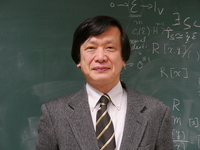Survey of MSJ
The Mathematical Society of Japan in the Troubled World

President of MSJYoichi Miyaoka
Mathematics is one of the oldest branches of science. As a system of practical knowledge of numbers and quantities, it is 5000 years old since Egyptian and Mesopotamian age, while mathematics as scientific activities based on rigorous logic started 2500 years ago in the Pythagorean school. Mathematics is a unique science that has a singular characteristic: duly proved mathematical statements stay true for ever. No other branch of science enjoys this privilege. Furthermore, mathematical results that were deduced from pure logic often give precise descriptions of the real world and eventually prove useful to our ordinary life. Logic or metaphysics does not account for this mysterious and marvelous fact. We mathematicians are entitled to be proud of having chosen such a noble subject and we should conduct our own researches with good conscience and confidence. The Mathematical Society of Japan will support mathematical researches through conferences, publications and awards.
At the same time, however, we mathematicians should be aware from time to time that we are ordinary citizens and have responsibility of citizens. Of course I am not talking about simplistic conclusions like an advertisement of applied mathematics. If your research is useful to the society, so good. But it would be important as well to convey mathematical way of thinking and its importance to wide range of population through school education, open lectures, publications and so forth. Also we are obliged to correct mathematically wrong arguments whenever we find ones in public opinions, media and policy making processes.
In 2011 we experienced a devastating earthquake and tsunami in Northeast Japan followed by fatal accidents at Fukushima nuclear power plant. These disasters demonstrated how fragile the foundation of our life was. We had to witness unbelievable scenes in which probable possibilities had been neglected and malfunctions that would lead to debacles were not seriously discussed.
This miserable situation would be rectified only when individual citizens could share sound common sense. Common sense is not a hereditary gift but gradually acquired at home, at school, in office and through media. Although common sense was traditionally considered to consist of ethics, history, economics and other humanities subjects, it is not the case in the contemporary society where advanced technology is ubiquitous. A good part of common sense is now made of knowledge of basic science and mathematical way of thinking which is necessary in applying pieces of scientific knowledge to given concrete situations. Unfortunately, our experiences have disclosed the fact that Japanese leaders and citizens do not have sufficient knowledge of science or mathematical skills. We are afraid that the skill of eliciting right judgement from a pile of data --- the core of which is mathematical thinking --- is specifically lacking.
We want as many people as possible to master mathematical way of thinking as a skill to cleverly live in the complex modern society without being deceived by disinformation or getting too nervous about unfounded rumors. The Mathematical Society of Japan is ready to offer necessary proposals to public institutions based on our mathematical expertise, and maintains our commitment to asserting the importance of mathematics and mathematical education through open lectures, ``Sugaku Tushin'' and our website. We wish that the Mathematical Society of Japan's activities will be supported by all the members.
